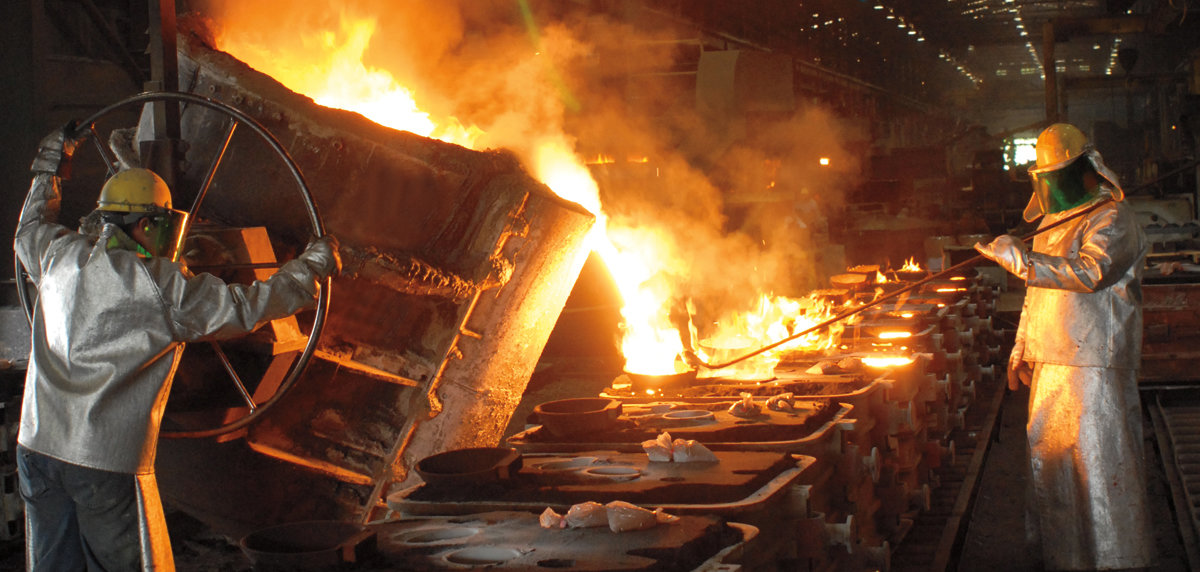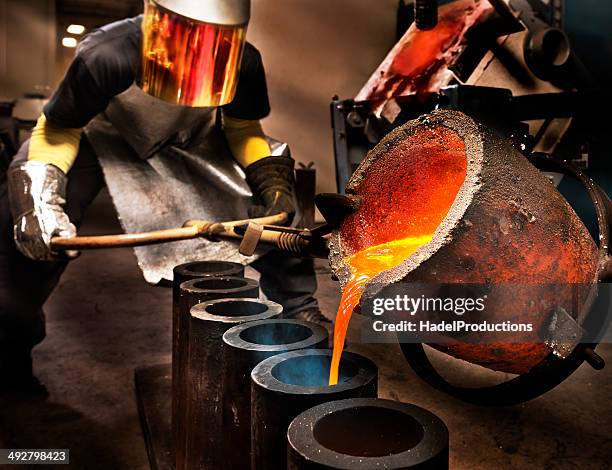Creative Lessons from the Artistic Side of Metal Casting
Wiki Article
A Comprehensive Guide to Metal Casting: Benefits and Providers Offered by Foundries
Metal casting is a crucial process in numerous sectors, providing countless advantages through the services of factories. These facilities change molten metal into specific and long lasting components, satisfying particular client requirements. By utilizing sophisticated modern technologies, foundries ensure quality and effectiveness in production. The ins and outs of metal casting and the varied techniques involved raise crucial inquiries about its role in contemporary production. What technologies exist ahead in this vital area?Comprehending the Metal Casting Process
The metal casting procedure is a basic strategy made use of in making to develop complicated shapes and components. This method involves putting liquified metal right into a mold developed to form the desired things. The procedure begins with pattern creation, which acts as a template for the mold and mildew. Metal Foundry. Numerous products, such as sand, metal, or ceramic, are utilized for mold-making, depending on the specific needs of the casting
As soon as the mold and mildew is prepared, molten metal is put right into it and enabled to solidify and cool. After solidification, the mold is gotten rid of, disclosing the cast part. Numerous methods, including sand casting, financial investment casting, and die casting, are employed, each fit to different applications and products. Quality assurance steps, such as evaluations and screening, are important to ensure the final item meets requirements. In general, the metal casting procedure plays a crucial role in generating parts for sectors ranging from auto to aerospace.
Secret Perks of Metal Casting
Metal casting offers substantial advantages that make it a recommended manufacturing technique in various markets. Its design versatility and precision permit for elaborate forms, while cost-efficient automation boosts efficiency. Furthermore, the versatility and stamina of materials used in casting contribute to the resilience of the end products.Layout Adaptability and Accuracy
Releasing impressive layout versatility and accuracy, metal casting enables developers and designers to create intricate forms and attributes that would be difficult or difficult to accomplish with various other manufacturing methods. This ability makes it possible for the manufacturing of intricate geometries, inner structures, and great information that enhance product functionality and aesthetic appeals. Additionally, different casting techniques, such as sand casting, investment casting, and pass away casting, provide more options for personalization, suiting diverse material properties and project requirements. The versatility of molds permits modifications during the design phase, improving the shift from idea to end product. Eventually, metal casting sticks out for its capability to provide high-precision elements, making it a very useful procedure in sectors varying from vehicle to aerospace and beyond.Affordable Automation
Affordable automation stands as one of the primary benefits of metal casting, making it possible for makers to create big quantities of components at a reduced expense each. This efficiency arises from the capacity to develop complex molds that can be reused numerous times, substantially minimizing setup and functional prices. Furthermore, metal casting processes, such as sand casting and die casting, allow for high throughput, making it feasible to fulfill the needs of large-scale manufacturing runs. The minimized material waste and power intake additionally boost expense savings, making metal casting an eye-catching choice for industries requiring bulk parts. In general, the cost-effective nature of metal casting placements it as a favored method for suppliers going for financial performance in their production procedures.Material Convenience and Stamina
Among the standout attributes of metal casting is its amazing product versatility, which enables making use of a variety of steels and alloys. This adaptability allows manufacturers to choose products that best fit their specific applications, from aluminum and bronze to iron and steel. Each metal uses unique properties, including differing levels of strength, corrosion resistance, and thermal conductivity. Metal casting can produce components that satisfy rigid efficiency demands across diverse industries, such as automobile, aerospace, and building. In addition, the toughness of cast metals can be enhanced with various therapy procedures, making certain longevity and longevity. Metal Foundry. In general, the combination of material flexibility and inherent strength makes metal casting a favored option for creating premium elementsKinds of Metal Casting Methods
Metal casting includes a range of methods that satisfy different manufacturing requirements and material buildings. Usual approaches consist of sand casting, which uses a sand mold for complex forms, and investment casting, recognized for its accuracy and surface finish. Pass away casting is an additional method that utilizes high-pressure injection of liquified metal right into molds, ideal for mass production of tiny components.Shell molding offers a much faster alternate, utilizing a resin-coated sand to create thin-walled mold and mildews, while shed foam casting enables intricate layouts without the requirement for a core.
Additionally, continual casting is used for producing lengthy areas of metal, such as bars or sheets, by strengthening molten metal in a continual procedure. Each technique is and offers distinct benefits chosen based on aspects like the required information, manufacturing volume, and product type, making certain remarkable outcomes in metal manufacture across numerous industries.
The Role of Foundries in Metal Casting
Factories play an essential duty in the metal casting process, functioning as the facilities where molten metal is changed into completed items. These specialized establishments are outfitted with the necessary devices and technologies to imp source manage various metals, making certain premium end results. Factories are in charge of several important functions, including thawing the metal, putting it into mold and mildews, and enabling it to solidify.In addition, they preserve rigorous security and environmental standards to safeguard employees and decrease environmental impact. Skilled professionals and engineers team up to enhance casting processes, enhancing effectiveness and reducing waste. Factories likewise engage in top quality control actions, guaranteeing that the end products satisfy details tolerances and specifications. This quality assurance is necessary for industries that depend on accurate elements, such as auto and aerospace. Because of this, factories add substantially to the general manufacturing landscape, allowing technology and development throughout different industries.
Customized Metal Casting Solutions
Custom metal casting services provide tailored design options that fulfill particular client demands. These services also offer material selection knowledge, making certain the appropriate metal is selected for the wanted application. Such adaptability and knowledge boost the overall high quality and efficiency of the end product.
Customized Style Solutions
Tailored design solutions in metal casting provide manufacturers with the flexibility to produce parts that fulfill certain performance and visual demands. Factories use personalized services that allow clients to define dimensions, forms, and surface finishes to accomplish wanted end results. This personalization process usually includes partnership between designers and designers, making sure that the last items align with operational needs and market standards. Advanced modern technologies, such as computer-aided layout (CAD) and simulation software application, enable exact modeling and screening of parts before production, decreasing mistakes and boosting efficiency. By leveraging tailored design services, services can enhance functionality while decreasing waste and expenses, eventually causing a much more one-upmanship in the marketplace. This flexibility is crucial for sectors calling for one-of-a-kind applications and specs.Product Selection Know-how
When choosing products for metal casting, expertise plays a necessary role in making sure that the right selection straightens with both performance requirements and cost-effectiveness. Foundries use knowledgeable specialists who understand the residential properties of different metals and alloys, permitting them to advise suitable materials for specific applications. Variables such as stamina, corrosion resistance, and thermal conductivity are carefully taken into consideration to satisfy the client's demands. Furthermore, sector patterns and developments in product scientific research inform these choices, allowing foundries to remain competitive. By leveraging their experience, factories can assist clients in steering via facility product alternatives, ultimately causing boosted product high quality and minimized production expenses. This customized understanding is vital for accomplishing effective results in custom metal casting solutions.Quality Assurance in Metal Casting
Quality assurance in metal casting is important to guarantee that the end products satisfy the needed requirements and efficiency standards. Factories use a range of approaches and strategies to guarantee the best quality of cast elements. This procedure begins with rigid product inspections, confirming that resources follow industry requirements. Throughout the casting procedure, real-time surveillance and screening are conducted to assess specifications such as temperature level, mold stability, and dimensional accuracy.
Applications of Metal Castings Across Industries
Metal spreadings play an essential duty in different sectors, serving as the foundation for numerous applications. In the automotive field, cast elements such as engine blocks and transmission real estates are required for lorry performance and integrity. The aerospace market relies on precision spreadings for crucial parts that guarantee security and performance in flight. Furthermore, the construction sector makes use of metal spreadings for fixtures, fittings, and architectural elements, improving the resilience of buildings and facilities.The energy sector benefits from castings utilized in generator blades and various other equipment necessary for power generation. The medical field additionally uses metal spreadings in instruments and gadgets, showing the versatility of this production procedure. Generally, metal spreadings are indispensable to the functionality and development of diverse industries, showcasing their value in contemporary technology and infrastructure advancement
Often Asked Concerns
What Materials Are Typically Utilized in Metal Casting?
Typical materials used in metal casting include light weight aluminum, iron, bronze, steel, and brass. Each material provides distinct residential properties ideal for different applications, enabling producers to select the most effective option based upon deterioration, weight, and stamina resistance.How much time Does the Metal Casting Refine Commonly Take?
The metal casting procedure usually takes several hours to a couple of days, depending upon this contact form elements such as the intricacy of the style, sort of metal made use of, and the particular casting method utilized by the foundry.
What Is the Ecological Impact of Metal Casting?
The ecological effect of metal casting consists of energy consumption, discharges, and waste generation. Foundries often apply steps to mitigate these impacts, such as recycling materials and utilizing cleaner innovations to reduce their environmental footprint.Can Metal Casting Be Done for Small-Scale Projects?
Metal casting can indeed be done for small projects. Different foundries satisfy such demands, providing tailored solutions that fit limited production runs while keeping quality and precision in the last products.What Are the Precaution in Metal Casting Foundries?
In metal casting shops, safety steps include individual safety devices, correct air flow, training on equipment see use, emergency situation treatments, regular maintenance checks, and adherence to industry security criteria to minimize risks connected with molten metal and unsafe materials.Furthermore, metal casting processes, such as sand casting and pass away casting, permit for high throughput, making it feasible to meet the demands of massive manufacturing runs. One of the standout features of metal casting is its remarkable material adaptability, which permits for the usage of a vast range of alloys and metals. Additionally, continuous casting is used for creating lengthy areas of metal, such as bars or sheets, by strengthening liquified metal in a constant procedure. Factories play an essential duty in the metal casting procedure, offering as the centers where molten metal is transformed into finished products. Common products made use of in metal casting consist of light weight aluminum, iron, steel, bronze, and brass.
Report this wiki page